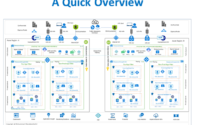Public Cloud Adoption in UAE Context
In UAE, enterprises play a huge role in making the economy successful. The larger enterprises contribute to 89.4% of the production activities in the UAE (UAE statistics center 2013). For the enterprise to be successful, it requires an effective ICT strategy; however, it is known to face various challenges in adopting and maintaining IT infrastructure. And effective adoption of ICT plays a big role in addressing the market needs. And to compete with domestic and foreign counterparts, the enterprises will have relative advantages with the public cloud adoption for their IT needs compared to the traditional non-cloud-based IT setup as the cloud enables quick testing of the services and helps in faster decision-making.
Cloud Adoption Barriers & Challenges
Enterprise will be more productive and competitive by using cloud computing services. However, the determinant factors affecting cloud services adoption are not always straightforward. Cloud computing adoption research needs to include context-based analysis of technological, organizational, and environmental factors and business models, as each context may have its own determinants. These factors could lead to successful adoption. Or also could lead to little or no use.
Despite the enormous technological advantages of cloud computing, its implementation has not matched the perceived benefits in UAE-based enterprises. The low adoption is due to various reasons such as
- Many companies are still in the learning stage and are closely studying and observing.
- Lack of awareness and know-how about the solutions.
- Hesitation in migrating to a new solution.
- Resolving network access and latency issues
- Skill shortage
- Cultural resistance to change within the organizational
- Data security
- Delayed cost-savings
- Workforce transition
UAE Leading the Way for Cloud Adoption
As a forerunner of innovation, UAE recognizes the opportunity to become a cloud and data center hub of the MENA region. In December 2015, the TRA launched the ICT development forum, acknowledging that cloud computing is one of the key drivers of the UAE’s digital transformation agenda. The move to a cloud-first economy is inspired by the UAE Vision 2021 and the national Innovation strategy and the TRA vision. Both public and private sector in UAE has been positive with moving workloads to the cloud. The motivation for cloud adoption includes a reduction in capital expenses; the flexibility to suit demand and allowing greater focus on delivering core services. UAE authority also recognizes the benefit of an economy of scale of cloud and the need to have the types and size of the enterprises access an elastic pool of computing resources. (TRA-Federal Authority 2018)
Public Cloud Providers/Hyperscalers in UAE
There are a number of cloud solution providers that have a physical presence in UAE, that includes home-grown private managed IT, service providers, overseas-based Hyperscalers such as Microsoft Azure, Oracle Cloud, G42cloud, etc. Details of some of the Hyperscaler presence are following.1) Oracle OCI (Oracle Cloud Infrastructure) – It has currently two cloud centers in UAE, located one in Abu Dhabi and another in Dubai. Some of the customers of oracle cloud include Emaar properties and Emirates postal group. Oracle was also part of the various skill development initiatives in the country such as with the UAE’s Higher colleges of Technology (HCT) and its commercial arm, the Center of Excellence for Applied Research & Training (CERT). 2) Microsoft Cloud – It has two cloud centers in the UAE, one in Abu Dhabi for disaster recovery solutions for customers in the northern part of the country, and one in Dubai for all customers and partners. Microsoft opened a cloud center in the UAE in 2019. 3) AWS – already has cloud-edge locations locally in the country, some of Amazon’s customers include MBRSC (Mohammed bin Rashid Space Centre) and Anghami and Sarwa. Two cloud centers of AWS are expected to open in the UAE in the first half of 2022.
Regulation and Compliance
Resident country regulations are one of the key requirements for public cloud adoption. UAE’s regulatory requirements for public cloud adoption need to comply with the following with the respect to the relevant industries
- Information Assurance Regulations (IAR) provide minimum cybersecurity requirements for key sectors in the UAE (Energy, Government, Finance and insurance, Health Services, Food and Agriculture, Information and communication technology, Electric and water, Transportation)
- Abu Dhabi Government, entities, contractors, and other third-party organizations must also comply with ADISS (Abu Dhabi Information Security Standards)
- Storing and processing of healthcare data within the country as per (UAE Federal – Health Data Law)
- The UAE DESC (Dubai Electronic Security Center) CSP Security standard provides guidelines for developing and implementing information security practices. The DESC follows standards that include ISO/IEC 27001:2013, ISO/IECT 27002:2013, ISO/IEC 27017:2015, Dubai Government information security regulations (ISR), CSA (Cloud Security Alliance), CCM (Cloud Control Matrix).
The CSPs must ensure that it follows these standards when it provides services to the companies in UAE.
Summary and the Growth Prospects
It is apparent that cloud computing is very important for UAE’s economic growth. In the year 2020, the public cloud service market in UAE recorded a 40.9% growth year on year (IDC 2021), and the expectation is to grow at a CAGR of 38.2% between 2020 and 2027. And the estimation of the clouding spending was 1.1 billion$ in 2019 and in 2022, it is expected to grow to 1.8 billion $ (UAE ministry of the economy – IDC, Dubai chamber of commerce, Fitch connect)



Dubai is always attracted latest technology, very informative post on UAE cloud adoption – thanks for sharing